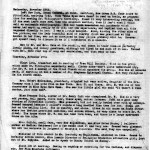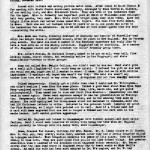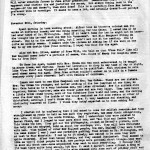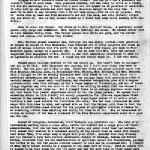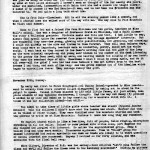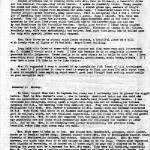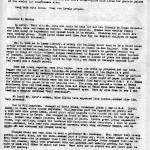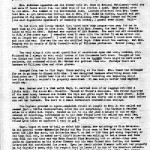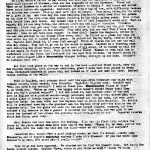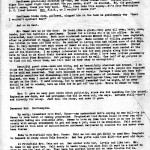Pine Mountain Settlement School
Series 09: Staff/Personnel
Alice Cobb
Travelogue – 1941
ALICE COBB TRAVELOGUE – 1941

TAGS: Alice Cobb, Pine Mountain Settlement School fundraising, donor travelogue, 1940, prospective donors, fund-raising, Mountain Eagle Screams, Northeast USA, religious perspectives, women’s rights, women’s clubs, city-folk, humor, New England upper-middle-class, Erd Harris, Mrs. Cate, Frances Colt, Boston, MA, Dr. Alfreda Withington, Free Will Society, Helen Rouse Guilds, Margaret Strong, Women’s Christian Temperance Union [W.C.T.U.], King’s Daughters, Baptist Church, Mrs. John C. Campbell, Danish Folk Schools,
ALICE COBB TRAVELOGUE transcription – 1941
In the early 1940s Alice Cobb, a worker for the Pine Mountain Settlement School, traveled the northeast United States to acquaint prospective donors with the mission, needs, and accomplishments of the School, and to gather names for the School’s mailing list.
In meticulous detail and with keen insight and humor, she describes in a conversational style her experiences, recording each step of her busy schedule, her observations of members of the New England upper middle class, and her successes and failures in dealing with them. She carefully describes the people she met, including their clothing, manners, family, background and the subjects they discussed, the homes they lived in and the food they served. She does so with tact, compassion, tolerance, and compassion, sprinkling her narrative with a bit of humor or irony.
I am always interested to see how much people along this line love to talk to me about their travels and interests, after I have been invited presumably to talk about Pine Mountain. But perhaps it is just as well. One half of my purpose is to find out all about them, and that half is very easy to accomplish. [Alice Cobb Travelogue 1941, page 08]
On the few occasions when she was treated rudely or disagreed with a person’s statements, she kept a polite facade before the offending person but didn’t mince words in her recording of the event.
For example, Miss Cobb explains her methods of engaging people in conversation so that the subjects led gently to Pine Mountain.
“[She] was ready to write me a check, but did not encourage it. I feel that I must not let myself be in position of solicitor. It will hurt my own morale and won’t help Pine Mountain enough in the long run. I want to be able to say honestly that I do not take money — that is not my purpose.” [Alice Cobb Travelogue 1941, page 04.]
It was a position that Alice Cobb maintained. Rather than asking directly for money for the School, she passed along the School’s positive aspects, such as its beauty and solitude, and the many ways it was helping the mountain people.
Remarkably, in her reports, she reveals as much about herself and her values as those she meets, such as her views on the value of education:
We agreed that education should be life itself, not merely preparation for life — an experience vital because it was necessary. No action is really significant unless it is action which fulfills a real need outside the individual who acts. [Alice Cobb Travelogue 1941, page 04.]
…her views on religious cults and unmarried women:
[I] said it seemed to me that women who did not marry and had too much time on their hands were likely to turn their thoughts too much in upon themselves. [Alice Cobb Travelogue 1941, page 04.]
…and in her longing for her college days:
They were the sweetest days of all. Sometimes I wish I could be young again, and do it all over — all the grief I have had has come because I was not always true to the best dreams I had then, and much of the happiness has grown somehow out of the idealism which began to crystallize there. [Alice Cobb Travelogue 1941, page 04.]
In the following 1941 travelogue, Miss Cobb travels to the Boston area (“Dr. Withington‘s territory”) and follows a schedule of meetings and speaking engagements suggested by Mrs. Cate, her hostess and mentor. Mrs. Cate had many connections due to her place in Boston society and the fact that she was already experienced in fundraising for the Pine Mountain Settlement School.
Mrs. C[ate] gave me many good hints about publicity, since she did speaking for the school. Emphasize new days, and new problems — the old is worn out, she says. Advises still — don’t ask directly for money. Just tell the story, and make it good. [Alice Cobb Travelogue 1941, page 09.]
Her detailed reports capture moments in cultural time. The time in her life and the time in the lives of the organizations and individuals she met during her many travels. The juxtaposition of country and city living stands out in many of her reports, as do her personal biases and her personal delights. Her reports are as much a personal “checking in” as they are a reflection of the geographic differences and the lifestyles of the many prospects she encountered through the years as a fundraiser for the School.
GALLERY: Alice Cobb – Travelogue 1941
- Alice Cobb Travelogue, 1941, page 01. [cobb_1941_travelogue_001.jpg]
- Alice Cobb Travelogue, 1941, page 02. [cobb_1941_travelogue_002.jpg]
- Alice Cobb Travelogue, 1941, page 03. [cobb_1941_travelogue_003.jpg]
- Alice Cobb Travelogue, 1941, page 04. [cobb_1941_travelogue_004.jpg]
- Alice Cobb Travelogue, 1941, page 05. [cobb_1941_travelogue_005.jpg]
- Alice Cobb Travelogue, 1941, page 05a. [cobb_1941_travelogue_005a.jpg]
- Alice Cobb Travelogue, 1941, page 06. [cobb_1941_travelogue_006.jpg]
- Alice Cobb Travelogue, 1941, page 07. [cobb_1941_travelogue_007.jpg]
- Alice Cobb Travelogue, 1941, page 08. [cobb_1941_travelogue_008.jpg]
- Alice Cobb Travelogue, 1941, page 09. [cobb_1941_travelogue_009.jpg]
TRANSCRIPTION: Alice Cobb – Travelogue 1941
[The text has been slightly edited.]
Page 01. [cobb_1941_travelogue_001.jpg]
Travelogue for Pine Mountain
[handwritten notation in margin: “After return from England 1939? 1940? 1941?”]
Wednesday, November 26th.
Left New York, Grand Central, at 3:40. Hartford, New Haven R.R. four hours to Pittsfield [MA], arriving 7:40. Took Mine Eyes Have Seen [book authored by Alfreda Withington in 1941] to read on train, as preparation for meeting Dr. Withington‘s territory. [….] However, got myself ready to discuss it as if I considered it a classic.
Met by Mr. Sheridan R. Cate and Mrs. Cate at the station, and taken to their home — a perfectly lovely place, and lovely guestroom, although too tired to see much of it all. Talked with Mrs. Cate over cup of soup and sandwiches, and then went to bed.
Thursday, November 27th
Slept late, breakfast and to meeting of Free Will Society. This is the group which knew Dr. Withington especially well. (Later note — can’t quite understand why, for Dr. W. not a member of the First Church which sponsors the group. She was as someone said, if anything at all a member of St. Stephens Episcopal Church. Not very religious in the church sense.)
Mrs. Robert McCracken, president, crippled but very active, daughter of the Mrs. Chesney whom I had note from in New York. Mrs. C. not there. Mrs. M. was one of the characters in Mine Eyes Have Seen [authored by Alfreda Withington, 1941] . She was the little girl who said “It wasn’t a real doctor, just some man”.
Miss Frances Colt, sister of Dr. Henry Colt who championed Dr. W. [Withington]. She is a very odd person, tall, spare, white hair, black eyes, rather intense. Told me a good many stories of Pittsfield history. Was pleasant, but not really bowled over with my message. Seemed annoyed because I couldn’t locate a long needled Pine tree for her. Shall put her on the mailing list. She is wealthy, and alone. Lives in old house on South Street where her brother practiced medicine, and across street, or very close to where Dr. W. lived. The house where Dr. W. was has been torn down, and there is a large apartment house on the site.
Mrs. Guilds [Helen Rouse Guilds], small, dark, very New Englandish, was Miss Helen Rouse, I believe — worker at Medical Settlement for a few weeks when it was very new. Seemed very pleasant but not too accurate in judgment of mountain children. She said they are unspoiled.
Minister of this church is Mr. Gratton, an Englishman, educated in Iowa. Seems to be fairly active church, Miss Lummis, Director of Religious Education, attractive girl, just out of Mt. Holyoke. Asked me to speak to Sunday School on Sunday.
About 100 at meeting. Sewing on napkins or something for the Indians, and diapers etc. for Pine Mountain infirmary.
Lovely drive around country past homes of Longfellow, Oliver Wendell Holmes, Herman Melville, and others. A beautiful old town, full of memories. Mrs. Cate is lovely — from Illinois, Smith College alumna.
Also met at meeting Miss Campbell, great friend of Dr. W. [Withington] and her sister Mrs. Van Ordan. (Later learned they are cousins of Rachel Field.)
Page 02. [cobb_1941_travelogue_002.jpg]
2.
Friday, November 28th.
Fussed with letters and moving picture until noon. After lunch to South Church for meeting with South Church missionary society, arranged by Miss Carrie M. Gleason, of our mailing list, and Mrs. Elizabeth Irwin. They are both of the Berkshire Home for the Aged. Miss G. formerly had important post at Smith or Williams — some college — tall, very gentle, very deaf. Mrs. Irwin short, bright eyes, very nice voice. Also met bright little short red haired woman named Mrs. Rogers. She came from North Adams, in Mass. Said she and her husband lived 50 years or so in one place and moved to the Berkshires for an adventure. He is 82 and was at that moment –guess what she said — insulating the attic.
Mrs. Monk was there, formerly resident of Kentucky and teacher at Pineville — and still has slight trace of southern accent, after 25 years in New England. Son in Vermont prep school. She said she knew a number of the Kentucky operators and would like to have a talk with me on the mining situation. Suggested tea or something. Is a member of St. Stephens church and might interest the Girls’ Friendly group there.
Mrs. Albert Patten, 24 Boylston Street, asked to be put on m.l. [mailing list], very tall, fine looking woman, church worker, and evidently active in the Congregational state organization — travels to other groups.
Home and called Mrs. Dwight Collins, who didn’t want to see me. Said she’d give me a small gift (Implied — if that would keep me quiet). I refused the gift so she said she would see me, right now if I wanted to come. I came. She let me in with obvious impatience. I apologized, hoped she wasn’t too busy. She said she wasn’t any busier then than she would be any other time. Altogether did not feel exactly welcome.
Talked desperately. Finally got a little thaw when I mentioned Dr. Withington [Dr. Alfreda Withington]– she didn’t realize I came from the same place.Talked a good deal about Mine Eyes Have Seen [Dr. Withington’s book]– perjured myself somewhat. Talked about time, life, death, etc., and got quite philosophical. Then asked her to come and visit Pine Mountain. Immediately she was back in armor again. Never went anywhere except to see her grandchildren in Washington. Desperately talked fast about grandchildren, and in the ensuing thaw said my adieus. She half apologized for brusqueness which had amounted to rudeness — said she had 100 Christmas letters to write. Believed in the personal touch (exactly my point for Pine Mountain, as I might have pointed out to her). Said if a friend sent her a card with name engraved that one was no longer a friend and the card went in the waste basket. Left amidst profuse agreeings.
Called Mr. England and talked to housekeeper with Yiddish accent — not much satisfaction. Said I would call tomorrow at 11:00, this being the time when Mr. England would probably be through with his daily bath, said housekeeper.
Home, dressed for dinner, birthday for Mrs. Reise. Mrs. R. leads choirs at S. Church. Mrs. R. very gay, very pretty, white hair, learned later they had a lovely daughter killed in toboggan accident. What tragedies underlie the peace of this place. Took an immediate liking to them both. They are good sound fine people who like decent things. Had greater admiration when I learned of the accident which happened rather recently. Mr. Reise drives over the same road where it happened every day to teach music at Miss Hall’s school. He said his wife had been much admired by Dr. W.’s nephew, and Dr. W. had a diamond ring she was to bequeath to ”Alice” but there was a change so Alice didn’t marry the nephew — hence no diamond ring. She remarked dryly that Dr. W. isn’t dead yet and there was still a chance.
During the evening Bob, a nephew, Senior at Williams, and Junior Phi Beta Kappa, arrived for the night — a lovely lovely boy. Just the kind I like so much — vitally…
Page 03. [cobb_1941_travelogue_003.jpg]
3.
…concerned with capital, labor, war, peace, mankind in general but not in particular. Will enter aviation forces in June after graduation. Immediately began a stirring argument over whether the end justifies the means, Bob always coming back to the enigma — if the end doesn’t, then what does? This is a quotation from Max Lerner, professor whom he worships. It seems to mean a lot, and actually doesn’t — or perhaps I’m wrong.
November 29th, Saturday.
Spent morning in town walking about. Alfred took me there — a colored man who works at different homes, and was doing something for the Cates. I asked him if he had ever heard of Dr. Withington. Said if it hadn’t been for her he might not be here — she brought him in — and said she was his “namesake”. Met Miss Margaret Strong on street. She is on the mailing list, but I hadn’t met her at the meeting. She is quite an elderly woman. I almost made the mistake of asking her if she were on her way to my own destination (that morning, I hope) the Home for the Aged.
Also met Mrs. Bliss, member of Free Will, who told me that “Free Will” like all New England names hadn’t a particle of sense, viz. House of Mercy for Hospital name. She is from Ohio.
To Home for Aged, talked with Mrs. Erwin who was much embarrassed to be caught in house dress, and dusting. Guess her invitation to drop in any time of day or night, like “Free Will” and “House of Mercy” needed to be qualified. Felt stricken to note good cheer among the aged. Even free movies couldn’t endear me to life in a female seminary sixty years removed. Left with feeling of doldrums.
Lunch and went to see Miss Campbell and Mrs. Van Orden. These are two sisters. Mrs. Van Orden the younger, and better looking of the two (married at one time, so Mrs. Cate tells me to a very handsome man, and later divorced) Now the sisters live together, travel together, make all their plans and are very happy. They have built a little brick dream house, most of the furniture from their old house, and the carving over the doorways. The inside of the house reminded me for some reason or other of Abbotsford, although I can’t think why. Mrs. V. very handsome and charming, and distinctly reserved at first. I think they both expected me to come asking for money.
I started out by confessing that I had asked to come for selfish reasons — and they straightened up ready to tell me how much they regretted, how many their obligations, etc. etc. I could see the words forming. Said I understood they were related to Rachel Field, and I longed to hear more about her, and “All This and Heaven Too” [1938]. This broke the ice. They got out the photographs, showed me Rachel’s picture, also the baby she has adopted, told me about her marriage, etc. They will have Christmas with her. Then talked of other New England people, the war, England (they were there the same summer I was) suet and yorkshire pudding, then around to Dr. [Alfreda] Withington, and at last to Pine Mountain. I led up to it slowly, and wanted to be sure they were quite disarmed. After that [we] talked freely, and they seemed fascinated. They seemed to like me too — I think people in N.E. are perhaps more personal about things — they want to know all about one — once acquainted they want to know everything. I finally felt I’d been there quite long enough, but Mrs. V. said I mustn’t leave without a drop of “home brew” — it was sweet — wee little wine glasses with some sort of prickly stuff and crackers. When I finally left they insisted I must come back to visit them for a long time — wanted their names on the mailing list, and might even come to visit Pine Mountain sometime. I would love to go back. They are dear, lovely people.
Page 04. [cobb_1941_travelogue_004.jpg]
4.
Stopped at Mrs. Wilson‘s house on Crofut street. She has just had a grandson, and couldn’t think of much else. Very gracious however, and was ready to write me a check, but did not encourage it. I feel that I must not let myself be in position of solicitor. It will hurt my own morale and won’t help Pine Mountain enough in the long run. I want to be able to say honestly that I do not take money — that is not my purpose. Mrs. C. wrote down my name and Pine Mountain’s and all the data, and will probably forget why she wrote it. She is very absent minded as I could tell even while talking with her. Still —
Home to dress for dinner. Bob drove me to Mrs. Robbins‘ house [A trustee for the Berkshire Athenaeum (the public library of Pittsfield) and was a former trustee of the Berkshire Museum] . A perfectly lovely place — very large and luxurious. Mrs. Robbins (Loring) was alone. We seemed rather lost in that immense dining room. The dinner plates were white and gold, and the silver heavy and ornate — the service very formal.
Mrs. Robbins looked somewhat sad, although she was alert, cordial — very gracious. At dinner we talked of Pine Mountain, then branched off to other subjects and found so much of mutual interest that I’m sorry to say we didn’t ever really get back to Pine Mountain again, except in a general way. I had an idea that Mrs. Cate had perhaps suggested this engagement to Mrs. Robbin’s, and felt especially determined to make it as agreeable as possible for her. I think she did rather enjoy it. I did very much.
Talked about college — whether or not one should go. She hadn’t been to college — her son is at Yale. Both daughters are married, and I don’t know where they went to school. One has just had a baby — a son. There are three new grand children [on] the Pine Mountain mailing list, in Pittsfield — Mrs. Wilson, Mrs. Robbins, and Mrs. Paddock. Said I thought as far as actual education went (she asked me how I felt about it) — practical information and method for living — my college began with graduation — that a certain amount of inner self-confidence, and whatever recognition goes with a degree professionally came from college, as did a large number of friendships, and all of these things together may have had more to do than I am willing to admit with the values I discovered in my work later on. But I thought there is no college anywhere which does all that those four years’ experience should do for the young person. We agreed that education should be life itself, not merely preparation for life — an experience vital because it was necessary. No action is really significant unless it is action which fulfills a real need outside the individual who acts. She has been interested in work camps with this idea in mind, and agreed with me that the fallacy with them is that the action is artificial — need created for the purpose of giving the children a chance to do something, rather than existing and crying for them to do it. She is interested of course on account of her son — I wondered if the Pine Mountain experience would be a good one for him.
Talked of religion — Buchmanism *, which disturbs and irritates her. She told of a testimonial meeting where a woman said, before her husband and a large group of their acquaintances, that she had been married 25 years, and never could bear her husband. [….] Decided that Judy O’Grady and the Colonel’s lady were sisters underneath — talked of Bahaism, Lamaism and Father Divine, concluded they are all manifestation of spiritual unrest and frustration, perhaps too little to do, too few people outside oneself to love and be concerned for. I thought of Miss Hoy‘s Vassar worship as a symptom of the same sort of thing. Said at random that it seemed to me that women who did not marry and had too much time on their hands were likely to turn their thoughts too much in upon themselves. She said “And widows!” Learned afterwards from Mrs. Cate of her tragedy. Her husband died very suddenly about three years ago, and she has been very lonely since then.
In connection with the “college cult” idea she said she knew a Princeton man who had been out for 35 years and had never missed a football game, all of which she thought…
Page 05. [cobb_1941_travelogue_005.jpg]
5.
…was just as silly as could be. For some reason or other Erd Harris flashed through my mind at that point although I haven’t seen or thought of him for nearly six years. I asked if by chance it was Erd Harris — it was, and he had been the Princeton man she referred to. We had quite a long talk about him.
She is from Ohio — Cleveland. All in all the evening passed like a moment, and when I started home she walked most of the way with me. She may come to Pine Mountain to visit next summer.
Home to find Bob and a friend Jim from Williams and two girls, teachers at Miss Hall’s school. One was a daughter of Professor Prate at Williams, and a Smith Alumna — the other a Wellesley graduate. Victrola music and this and that. I had little to say, always find myself quite far removed from present day college students’ interests. But how wonderful they are — how young, glowing with possibilities, how gracious, and charming. I could sit quietly on the side and listen to them forever. They call back halcyon days, when books were so important, teachers were so wonderful, poetry, music, art, the whole world. I went back as they talked to the dean’s sitting room and the glow of the lamp on the worn oriental carpet — my old young self hidden in the shadow of the desk listening to the poetry the Dean read, with my ears, and hearing inside the singing of my own heart. They were the sweetest days of all. Sometimes I wish I could be young again, and do it all over — all the grief I have had has come because I was not always true to the best dreams I had then, and much of the happiness has grown somehow out of the idealism which began to crystallize there. Yes, college really was good.
November 30th, Sunday.
Up early and first to First Congregational Sunday School — greeted by Miss Lummis — went to worship room where incurred slight disapproval by asking not to stand in the pulpit to speak. Talked fifteen minutes to 150 cold little faces, all just alike, complete absence of any opinions whatsoever, I thought. On the way out Nancy (?) pressed a nickel in my hand and asked me to buy something for a mountain child with it. I think it was her collection nickel — but still —
Was asked to take class of little girls whose teacher was absent (typical Sunday School!) Told the children I didn’t know what the lesson was about. Neither did they so we talked of other things. They were thrilled over the mountain stories and took the address to write me at Pine Mountain. Curious to know how long they may remember.
To Baptist church which is like a beehive, full of people, bells ringing, microphone shrieking in all the halls. Talked to room packed with little ones, part Negroes who all clapped and gurgled with interest. So unlike the sophisticated group. Sang a ballad song and they were ecstatic. Thunderous applause. Then to “Co-ed” group who seemed interested by rather apathetic and dumb as Coeds are likely to be where questions of social interest are concerned. Anyway I rattled on for forty minutes, and was exhausted when the final bell rang.
Miss Gilbert, Director of R.E. was too smiley — told children “Let’s sing Follow the Gleam and we’ll all follow the Gleam down to the Kentucky mountains!” Holding up picture of Jesus and children “These are city children, Let’s pretend they are mountain children with overalls, straw hats, calico aprons and sun bonnets” etc.
Mr. Cate met me after church.
Page 05a. [cobb_1941_travelogue_005a.jpg]
5.
Rested afternoon and in evening drove with Mrs. Cate to Richmond, a beautiful drive and the sweetest village — tiny white church. I spoke in community house. Young people had cocoa and cake first — rather a large group, several grown-ups, members of King’s Daughters who have helped Pine Mountain for some time. I remembered boxes from there. Country people — great interest, many questions. Felt so delighted that I did a better job of speaking than before — best of the trip I guess. Sang a ballad. Mrs. Cate was pleased. They all loved the pictures. School superintendent said he had heard two speeches in the past five years which thrilled him to the marrow — this one and one by the Schoolhouse in the Foothills teacher. Hardly knew whether I like being coupled with her but took it as it was meant and was pleased. Minister of church is Mr. Cutler, [Joshua M. Cutler ?] scholarly man, wife very enthusiastic and active. Feel sure this group can be called upon for help with special letter and will respond.
Mrs. Cate drove me by school which Lucia attends, a beautiful place on a hill with lovely view of lights of Pittsfield. Magnificent building.
Long talk with Cates at home — told many stories and they were very much interested. Mr. C. thinks I should write a book. I like him because he is so completely sincere — so generous in his judgments. Seems really to do unto others as he would be done by. I love everything about them — their kindness, tolerance, graciousness, music books, friends. If I ever have a home I’d like it to be like theirs.
Mrs. C. suggested I keep a journal of my travels for P.M. (seed of this travelogue). Mr. C. said if I published it they’d read it eagerly to find out what I’d said about them. I said it couldn’t have anything which wasn’t good (and thought that nothing could really be good enough to say).
December 1, Monday.
To town, bought blue belt to replace the cheap one I nervously tore to pieces the night before. Went to Mrs. Barker‘s house. She is lovely. Mentioned Union [Union Theological Seminary] and she said she had one association with the seminary — her son Jack’s best friend Douglas Vernon. I was astounded and delighted, having spent a night with Doug and Dot at Bloomington, Indiana, speaking for P.M., and knowing them from seminary days. They are returning to States from Philippines this week. Mrs. Barker a classmate of Mrs. Zande — said she became interested in P.M. when Ethel told about it at Alumnae meetings — said Ethel was not a very outstanding girl in college, quiet, not too brilliant apparently, but had found her real self and growth in the mountains. Mrs. B. said she supposed that the qualities which make for college age popularity are not those which necessarily make for efficiency and success in later life. And so on. Mrs. B. is charming — has lovely aristocratic, but gracious mien, beautiful voice like cold cream only not cold.
Mrs. Monk came to take me to tea. Her friend Mrs. Hendershot, pleasant, scout leader, drove us to Swedish coffee shop. Several others there — Mrs. Eby of Morningside Baptist church, formerly of Martinsville, Indiana, and others. General Electric people. Mrs. M. very nervous, not quite sure what to do and seemed to lean on me for help. Others also impressed with dignity of occasion, so it looked as if there might be gaps and I started in to talk feeling the party must be a success for Mrs. M’s sake. They were all thrilled, especially Mrs. M. It really was a howling success — nice Swedish rolls not as nice as in Sweden, but did well for America, and everyone seemed happy.
Home to dinner — seems Mr. Cate had Mr. Eby‘s son in S.S. class and treated story of Jonah and the whale too lightly. Mr. E. brought to his attention a newspaper clipping telling how a man was swallowed by a whale off the coast of Iceland or N. Zealand or some-….
Page 06. [cobb_1941_travelogue_006.jpg]
6.
…[where] far away, and was brought out alive a few hours later — quite blue (from the gastric juices of the whale) but nonetheless alive.
Long talk with Cates. They are lovely people.
December 2, Monday
Up early. Went with Mr. Cate and Lucia to take her and her friends to Crane School — where Mrs. Cate had taken me before. Gorgeous mansion. Cranes were wealthy family who lost money in depression and opened house to be school. Children who go there are very wealthy group. Think Lucia seems much like Jane Fay and English children of upper middle class at Brickwell.
Mr. Cate]. took me to Lenox library — a lovely old building which used to be a Court house, lovely arched and carved doorways, white woodwork so common in New England. Then to see setting of Berkshire Symphonic festival — huge open air theatre in gardens overlooking range on range of hills — trimmed hedges reminiscent of England but made of cedar instead of boxwood. Lovely but lonely old house, former home of donors of place now unused — such a pity. Saw Kosevitski’s (sp) [Serge Koussevitzky, musician] house on high hill, and below it Carnegie mansion (100 bed rooms) now a Jesuit school.
Home, and young reporter came from the [Berkshire]Eagle [Not Whitesburg Newpaper] [I] Gave him write up prepared and had talk. Begged him not to call us “Hill billies” — he promised because 1) The Eagle is a good newspaper (he said) 2) Berkshire people are also in the hill billy class. Took my picture and promised not to use it if it should be bad. (Note — later sight of paper indicated that both picture and article were bad for I couldn’t find anything about P.M.) Mr. Edman the editor of the paper is on our mailing list. The young man pulled a volume of Marie Antoinette from the book case, as being size and shape of “Mine Eyes Have Seen“. Took one picture of me reading page with interest, downcast eyes. Cast my eyes down to see I was reading a chapter entitled “Self awareness”.
At lunch Mr. Cate’s sister, Miss Olivia Cate appeared from Boston — looked like him. Very pleasant.
Bus to Williamstown. Changed at North Adams, dreariest place I saw in N.E. Dirty, smoky, no clean white houses anywhere. Williamstown just the opposite — so pretty and quiet with wide green lawns, great quiet solid massive white houses set far back from street and trees in front. Bus stopped in front of Mrs. Baxter‘s house, at the top of the hill. Looked very simple outside, and in need of paint. Inside great lovely expansive rooms, high ceilings, simple but handsome old furniture — wide staircase. I went to guest room — enormous, twin beds with candlewick spreads, everything extremely simple, and so clean — It was starched and ironed looking.
Changed dress and went down to meet a professor Mr. Blakeney. Mrs. Baxter very lovely person — quiet, kind, not too warm — seemed just a little shy, which always makes me shy too. Mrs. Comer came — she is younger than I had expected, or perhaps looks younger than she is. Tall and slender, small nose, prominent chin, and glasses — not exactly pretty, but very nice to look at — I liked to watch her face. Went with her to church and got there just in time for meeting.
On the front row whom should I see first but Captain Cross, which surprised me the more because it was a ladies aid society or something of the sort. Wanted to rush over and greet him but everyone was in a hurry, so amidst confusion, and nods and bows, and some stumbling over cord of extension attached to my lantern, I started off somehow. Warmed up and talked industrial boom very inspired (inside at least) if not sufficiently well informed.
Page 07. [cobb_1941_travelogue_007.jpg]
7.
Captain Cross was sitting with a very old lady, also deaf, so I shouted to them and presume the rest of the audience heard. All seemed delighted.
Mrs. Alderman [?] appeared — an old worker with Dr. [Grace] Huse at Medical Settlement — said she had made 67 talks about P.M. and used some of the stories I used. Made mental note to cut mine. She seemed on the sentimental side. [….]
To tea which was lovely except that there were many people — too many for me to meet them as I’d like to have done. Talked with Mrs. French, the deaf lady. She is blind as well as deaf. Husband was curator of Art Museum. She sent her art collection to P.M. a few years ago. I remember when it came with the letter “I am an artist who can no longer see pictures“. I cried over it at the time and wished I could know her — and here she was. She was the one who notified Capt. Cross about the meeting. Met Mrs. Doughty who is cousin of Kitty Russell [former PMSS worker] — wife of Williams professor. Rather young, and attractive.
Tea very elegant with usual quantities of sandwiches open and shut, cookies, etc. Wondered as I always do what would become of the thousands left over. Thought of the tea Gladys [Gladys Morris] and I had for Barby [Barbara Faulkner] last summer and how we thought there might be left overs, carloads, but reckoned without Mr. Garner who gobbled them all. Perhaps there are Garners at Williams also and other places.
Emerged from tea to find Capt. Cross waiting at the door. Mr. Comer had arranged for me to go home to dinner with him. I was delighted because everything about him fascinates me. I could hear him all over the church bellowing and exploding about how Pine Mountain couldn’t be properly described. It was always better than anybody could say.
Mrs. Baxter and I visited until Capt. C[ross]. carried some of my luggage out — had a little talk. She knows Mrs. [Dorothy Olcott] Elsmith. Talked of women’s colleges. She rather approves of the co-ed ones, because she thinks the boys and girls ought to know each other. Altho she said it didn’t help much in her case because she was thirty and a shy old maid before she met her husband. She went to a small midwestern coeducational college.
The Captain [Cross] pranced in again — exploded rather at length to Mrs. B. [Baxter ?] who smiled and seemed just a trifle disconcerted, which was not surprising. The Captain a decided noise in a still N.E. foyer. Handed me out to his car like a knight of old or a Ky. colonel or something, introduced me to his dear friend “Love” who smiled and said “Yes, Captain, No Captain. Capt: “I can’t afford a chauffeur — but why should I when my dear friend Love takes me anywhere I want to go?”
Capt. [ Cross] began at once to tell me about his legacy, now mythology at Pine Mountain. In his general words — [….] [Katherine Pettit and May Stone] made quite an impression on his sister Eleanor and his dear friend Mrs. Curtis, who became interested and contributed for years. Upon her death sister Eleanor left all her property in the Captain’s care, with the request that he leave it to one of the mountain schools. With forethought, he went to a lawyer — an old friend — to draw up the will. The lawyer told him “Frank, it’s too large a sum to leave any school sight unseen. Go down and look over the schools”. He did and he’ll be glad to his dying day that he took that advice.
Page 08. [cobb_1941_travelogue_008.jpg]
8.
He first wrote a letter to May Stone, and what was his amazement to find her at Louisville instead of Hindman, when she was supposed to be the Director. Wired her “Meet me at Hindman on a matter of financial interest to school.” Got there and waited three hours before she appeared. Secretary got them a cup of tea, with difficulty because the kitchen was closed. Finally said he’d wait no longer. Come along Helen, (to his wife) we’ll give it up. […] (When they got away they stopped at a house up the road, and the girl there said “Did you have supper at the school?”. They said yes, and she said “Then I know you’re starved. Come in and have some supper.” So they did.) Lewis the Sergeant, driver of the car was addicted to his whisky after every meal. He filled up a glass and then put some water in, and it turned bright green. He yelled out, “Cap’n, Cap’n, what’ll I do with it?” Captain said “Drink it, if you’re fool enough!” Which of course did not set too well with May Stone [a member of the Women’s Christian Temperance Union [W.C.T.U.] . Hindman was originally named the W.C.T.U Settlement] They had to go out in the woods to smoke. Captain in a towering rage. [….]
All this took place on the way to and in the house — another dream house, very old New England colonial, with circular staircase, great I mean vast fire places in every room furniture hundreds of years old, and looked as if used and used and used. Ancient rifles hanging on the walls.
[Captain Cross’ ] Wife is English, much younger about half his age — from Yorkshire and talks with cockney accent, chain smoked, very friendly. Typically English meal. Captain said “Will you have a dry martini” — I said no thank you. “Glass of beer” I, no thank you. “Helen my dear, the lovely child doesn’t drink! Fancy that! Then will you try a pickled walnut?” I did and loved it, had another — rest of the meal just as English as a pickled walnut — soggy potatoes, meat very heavy, minced pie, with a whole glass of brandy dumped over it, so it burned all the way down, but very good. Together, Helen (“my dear wife”) and the Captain told me about Pine Mountain. Dr. Morris [probably [Glyn] Morris] will be president some day — the greatest man the Captain ever met — the kind he can do business with. The two girls who made his bed and turned hospital corners, and then refused a tip because he was a guest! I wondered who they were, and was glad it was those two instead of two others who probably would have, guests or not, repeated remarks about May Stone, poor lady.
Mrs. French had told him about the meeting. This was his first trip outside the house in two years except when Love took him to the bank. “Fancy it, my dear, put on the first row, with the lame the halt and the blind — what an old fossil you married!”
Described Mrs. Comer — “Not a good looking woman, my dear (to Helen) — teeth like Eleanor’s [Roosevelt] and if there’s anybody I hate it’s Eleanor! If you had teeth like Eleanor’s my dear, I’d shoot you — I really would!”
Time to go and Love appeared. We started out to find the Comers’ home. Got among the large country places. Captain: “Love, where do you think we are?” Love: “I think, Captain, that we’re out among the higher ups!”
Stopped at one place. Captain got out to see if it was the right one. Lovely old New England gentleman reminiscent of Emerson or someone came to door. Capt: “My dear chap, can you tell me where Mrs. Comer lives — Comer is the name (in a bellow)”.
Page 09. [cobb_1941_travelogue_009.jpg]
9.
Gentleman graciously directed us — one, two, three houses over. Captain pulled cigar from upper right hand pocket. “Do you smoke, sir?” he shouted. No, the gentleman didn’t smoke, thank you very much. “Well, then take this anyway — It’s from Washington D.C. (loud bellow) Not F.D.R., or I wouldn’t smoke it!”
Gentleman broke down, guffawed, slapped him on the back in gentlemanly way “Haw! I wouldn’t eyether! Haw!”
And on we went.
Mr. Comer met us at the door. He looks like a ghost — very gray all over, hair, face, hands, just too terribly a gentleman.
Talked for a little while in his office. He is not interested, only courteous. Much more concerned because Moscow still hasn’t been captured, after he predicted it would be captured long ago. Made mistake of telling pageant story, too trivial to take his time with. We retired to living room and talked more of old days. Mrs. C [Comer]. very earnest — not much sense of humor at all, but sincerely interested. (Noted that Mr. C. talked long and long about his trip to Russia and seemed much rested at the end of his discourse. I am always interested to see how much people along this line love to talk to me about their travels and interests, after I have been invited presumably to talk about Pine Mountain. But perhaps it is just as well. One half of my purpose is to find out all about them, and that half is very easy to accomplish.)
Beautiful guest room — bare and white, and so beautifully starched and ironed. I do think New England hospitality is beautiful. Can’t understand why N.E. people are supposed to be cold and reserved. They have welcomed me so warmly. Perhaps I have not been sufficiently sensitive and discerning — but I have not been aware of coldness. Only Mr. Simon England, who when I called gave me typical Jewish greeting — no time, and didn’t know how he got on the list. I said nothing, but to myself remarked that he might, if he ever should be led to wonder, have an idea how he got off the list. Wrote to Janet to take him off at once.
Mrs. C. [Comer] gave me many good hints about publicity, since she did speaking for the school. Emphasize new days, and new problems — the old is worn out, she says. Advises still — don’t ask directly for money. Just tell the story, and make it good.
December 3rd. Northampton.
Up early, breakfast with Prof. Comer — can understand Bob’s saying he was dull — he is. Seems to have habit of making prophecies. Prophesied that Harlan would be over run with outsiders taking all available jobs. Seems to have an idea that there is no one in the county with enough shrewdness to get and keep a job, once it is available. Felt rather irritated at this kind of authoritative statement delivered by someone who has never even been there.
Ride to Pittsfield with Mrs. Comer. Told me how she got $1000 to send Mrs. [John C.] Campbell to Denmark to study about Folk Schools. Had few gifts less than $100 — the good old days.
At Pittsfield Mrs. Cate met us. Her sister with her. Lovely and like her. Mr. C. came to say good bye. Felt sorry to leave them, but also felt it must be a relief to them to see the last of me. They were too perfect hosts not to take trouble for me.
At Northampton called several people, including Dorothy Elsmith at Woods Hole. Felt sad to refuse invitation to Woods Hole on account of Friday appointment at 287. This having two jobs is the very limit. In the beginning Northampton did not show me its most hospitable face. Taxi man most cordial one I met for some time. However Miss Hale‘s home lovely and Mrs. Allen very gracious.
SEE ALSO:
ALICE COBB – Biography
ALICE COBB – PMSS NOTES, NOVEMBER 1927
[Issue edited by Alice Cobb]
ALICE COBB Correspondence 1940s – Image and transcription of contract between PMSS and Cobb for publicity work.
ALICE COBB’S REPORT TO TRUSTEE DOROTHY ELSMITH 1944
ALICE COBB GUIDE TO WRITING, STORIES & LETTERS
ALICE COBB – TRAVELOGUE 1941
GLYN MORRIS Letter to Alice Cobb, 1976

